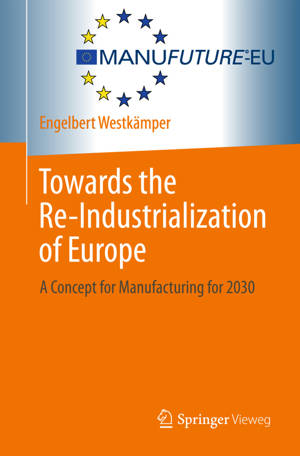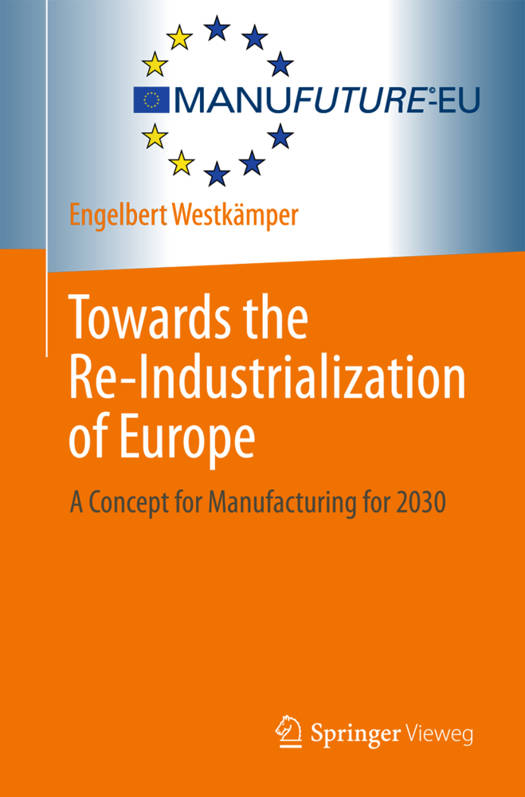
- Retrait gratuit dans votre magasin Club
- 7.000.000 titres dans notre catalogue
- Payer en toute sécurité
- Toujours un magasin près de chez vous
- Retrait gratuit dans votre magasin Club
- 7.000.000 titres dans notre catalogue
- Payer en toute sécurité
- Toujours un magasin près de chez vous
Towards the Re-Industrialization of Europe
A Concept for Manufacturing for 2030
Engelbert Westkämper
Livre relié | Anglais
105,45 €
+ 210 points
Format
Description
Not only are European industries shrinking and experiencing diminishment of their capability to add value, but Europe has lost more than a third of its GDP, which had been primarily based on manufacturing, and it suffers the consequences in high unemployment and weakened states finance.
This book is intended as a significant contribution to the on-going European discussions after the economic crisis and the economic problems in many regions. It is meant to enrich actual political dialogues for overcoming the crises by activating new potentials of high added value. As such, it seeks to provide the necessary orientation for enacting fundamental changes of business models and factory capabilities in order to meet the challenges of the global economy and minimizing environmental impacts. It also opens perspectives for enterprise strategies and for further research topics. Concrete recommendations are made for fields of action and future development towards achieving a sustainable industrial sector in Europe.
'Towards the Re-Industrialization of Europe' is based on megatrends, societal challenges and objectives for factories development. Focused on the realization of these goals by 2030, the treatise addresses four major topics of the European strategy in manufacturing: manufacturing in the urban environment; green manufacturing; manufacturing in the value chain, and manufacturing in the age of knowledge and communication. One enabler of this strategic orientation is the implementation of holistic manufacturing systems which reflect manufacturing as a social-technical system that has to be innovated, optimized and adapted to the future requirements by implementation of enabling technologies and human skill. The public infrastructure and reviving industries must also be able to support the strengthening of the economy through collaboration in research and education.
This book is intended as a significant contribution to the on-going European discussions after the economic crisis and the economic problems in many regions. It is meant to enrich actual political dialogues for overcoming the crises by activating new potentials of high added value. As such, it seeks to provide the necessary orientation for enacting fundamental changes of business models and factory capabilities in order to meet the challenges of the global economy and minimizing environmental impacts. It also opens perspectives for enterprise strategies and for further research topics. Concrete recommendations are made for fields of action and future development towards achieving a sustainable industrial sector in Europe.
'Towards the Re-Industrialization of Europe' is based on megatrends, societal challenges and objectives for factories development. Focused on the realization of these goals by 2030, the treatise addresses four major topics of the European strategy in manufacturing: manufacturing in the urban environment; green manufacturing; manufacturing in the value chain, and manufacturing in the age of knowledge and communication. One enabler of this strategic orientation is the implementation of holistic manufacturing systems which reflect manufacturing as a social-technical system that has to be innovated, optimized and adapted to the future requirements by implementation of enabling technologies and human skill. The public infrastructure and reviving industries must also be able to support the strengthening of the economy through collaboration in research and education.
Spécifications
Parties prenantes
- Auteur(s) :
- Editeur:
Contenu
- Nombre de pages :
- 112
- Langue:
- Anglais
Caractéristiques
- EAN:
- 9783642385018
- Date de parution :
- 16-08-13
- Format:
- Livre relié
- Format numérique:
- Genaaid
- Dimensions :
- 156 mm x 234 mm
- Poids :
- 362 g







